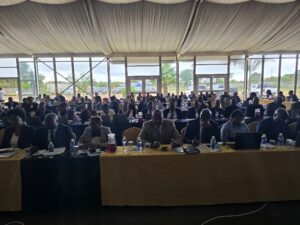Staff Reporter
Midlands Minister of State for Provincial Affairs and Devolution, Owen Ncube, has called for a significant acceleration in the implementation of climate-smart, energy-efficient programmes, in a bid to reduce Zimbabwe’s reliance on electricity imports, lower energy costs, and curb carbon emissions.
Speaking on Monday at the Ministry of Energy and Power Development’s 2026 Strategic Planning Workshop currently running in Kwekwe, Ncube emphasized the critical need for a people-centered energy development trajectory, built on affordable and sustainable sources.

“As the Midlands leadership, we urge the Ministry to intensify implementation of climate-smart, energy-efficient programmes critical in reducing electricity imports, energy bills and carbon emissions,” he said.
Ncube called for an aggressive awareness campaign on renewable energy and for industry to adopt high-technology equipment. He also pushed for stricter enforcement of lighting regulations, citing the ban on inefficient lighting products.
The minister lauded recent strides in Zimbabwe’s energy sector, including discovery of gas deposits in Muzarabani, a pledged pipeline from Namibia to Bulawayo, and expanded solar generation through mini-grids. He also recognized net-metering partnerships with independent power producers and the decentralisation efforts by the Zimbabwe Energy Regulatory Authority (ZERA), including the installation of an electric car charging point in Gweru.
“These tangible and visible impactful programmes are in line with the Second Republic’s goal of universal access to affordable sustainable energy,” Ncube told workshop attendees, which included the Minister of Energy and Power Development, July Moyo, as well as other government officials and stakeholders.
According to CEIC data, in 2023, Zimbabwe’s total carbon dioxide (CO₂) emissions reached approximately 11.744 million metric tons, up from around 10.963 million in 2022. CO₂ emissions per capita in 2023 were 0.624 tonnes, a rise from 0.595 tonnes in 2022.
According to Worldometer data, Zimbabwe emitted 10.22 million tonnes of fossil CO₂ in 2022, up 6.06 percent from the previous year, with per capita emissions of 0.64 tons.



